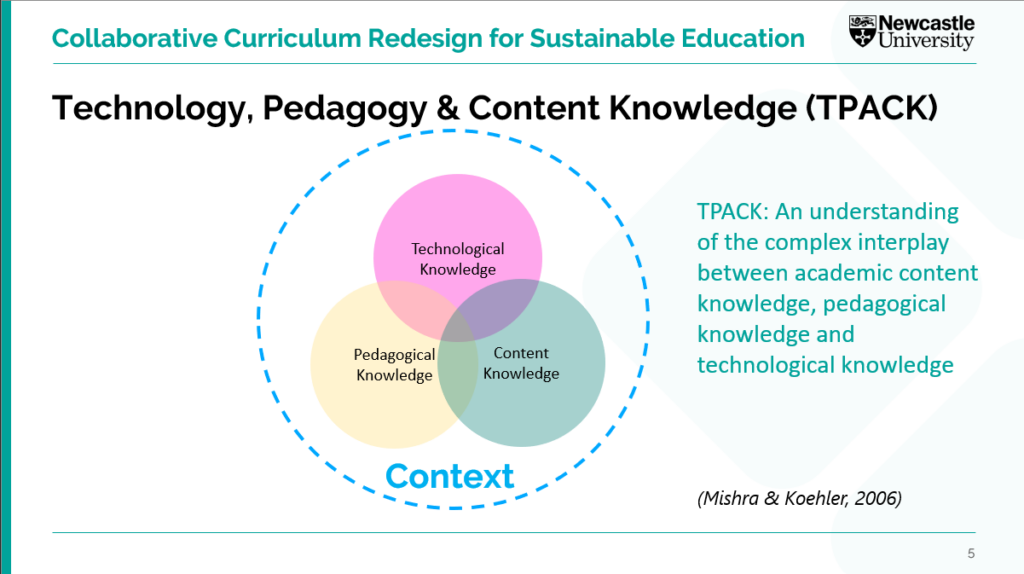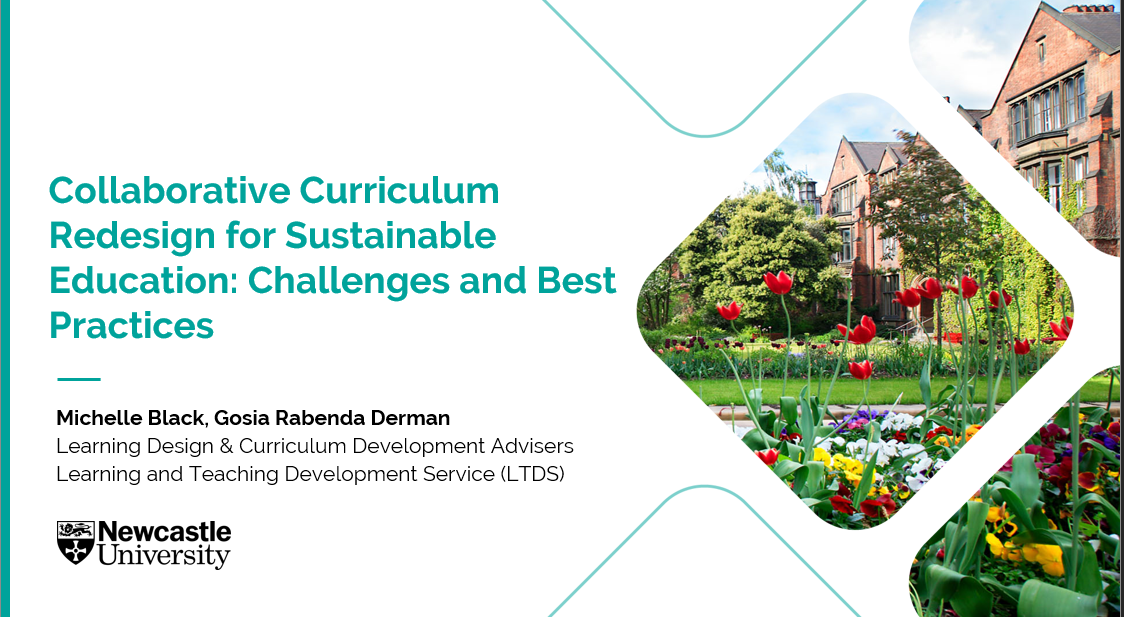In a recent presentation at the Three Rivers Conference, Learning and Teaching Development Service (LTDS) advisers Gosia Rabenda Derman and Michelle Black shared their learning on collaborative approaches to curriculum redesign from a project they have been working on with academic and professional colleagues in the School of Natural and Environmental Sciences (SNES). Read the summary of the presentation, and learn more about the project.
About the Curriculum Redesign Project
This curriculum redesign project has involved a partnership between LTDS and SNES colleagues and is one of the largest curriculum design projects we have worked on collaboratively. The ultimate goal is to enhance undergraduate programmes in Agriculture, Earth and Environment, and Applied Social Sciences (AESSC) to ensure graduates develop the employability skills required for the future of work, a global perspective of their discipline and other disciplines through multi-disciplinary learning, and a solid understanding of the sustainability challenges addressed by the UN Sustainable Development Goals (SDGs). The project stresses the importance of equipping students with the skills and agency to address sustainability challenges and discover potential interdisciplinary solutions.
Technology, Pedagogy and Content Knowledge
We believe collaboration is fundamental in curriculum design, and we have applied the TPACK model that underpins our belief in the importance of bringing together specialist teams of educators if true innovation is to be realised.
Academic colleagues provide content and pedagogical knowledge, and curriculum design advisers and content developers from LTDS provide pedagogical and technological knowledge. Through this convergence of knowledge, the project team are able to understand the complex interplay between the dimensions and intersections of knowledge. Collaboration involving educational designers can also support academics to construct, develop and enhance their own TPACK, through pedagogical and technological upskilling.
The context in which we work has a significant effect on the project, such as degree level, discipline, institutional and even school cultures, financial constraints and governance structures. These influence developments and can present challenges on the choices we make, and the engagement we receive from academic colleagues and students. Collaboration with our professional service colleagues in SNES is an important aspect of ensuring the success of this redesign project.

Challenges of the Collaborative Work
Like every complex, large project with many stakeholders (e.g. academic colleagues, professional services colleagues, library colleagues, industry partners) the project posed some challenges. One of those was the workload and conflicting priorities faced by colleagues. Balancing curriculum changes for future academic years with existing teaching and research commitments proved demanding. Additionally, engaging students in consultations and programme co-design posed a challenge, despite offering incentives for their participation.
Key Tips for Successful Collaboration
The presentation provided insights and recommendations for effective collaboration in collaborative curriculum redesign projects:
- Receive strategic commitment and allocate sufficient resources to the project.
- Identify key stakeholders early on and build strong relationships with them.
- Set clear expectations, milestones, workstreams, and responsibilities throughout the project’s phases.
- Showcase previous successful curriculum design projects to instil confidence and generate new ideas.
- Consider key dates in the academic calendar when planning engagement opportunities.
- Schedule face-to-face, online, and hybrid design and development conversations.
- Provide a range of online collaboration and project management tools.
- Prioritize pedagogical technology upskilling to ensure sustainable delivery of the redesigned curriculum.
- Foster social and informal conversations by creating a supportive environment, including providing tea and cake.
Successful Collaborative Approaches
Several examples of successful collaborative approaches were shared during the presentation.
Skills Journey and Reflective Practice
As a part of the project, we’ve prepared visual representations of the skills journey aligned with the NuReflect reflective practice templates. This allows students to track their skills development, compile examples of proficiency, and effectively respond to behavioural interview questions.
Virtual Farm Tours
Virtual tours were utilised not only to introduce farm facilities but also to enhance the learning experience, particularly in fieldwork activities. It required significant collaboration between LTDS, academics, colleagues managing farm facilities, technicians, and more.
Visit the Farms: Nafferton | Cockle Park
Read the case study on creating the farm tours in our Case Studies Database.
SDG Mapping
A multidisciplinary, collaborative approach was also employed to map the Sustainable Development Goals (SDGs) across the programmes. The objective was to raise awareness among academic colleagues, showcase students’ sustainability education journey, and encourage explicit incorporation of sustainability and SDG content into the curriculum. A report from the mapping will be available soon.
The importance of a collaborative approach
The collaborative curriculum redesign project showcased the importance of collaboration, strategic commitment, and effective communication in embedding education for sustainability. By partnering with academic, professional, and support services colleagues, the curriculum redesign has integrated sustainability principles and fostered interdisciplinary collaboration.
For further details and examples of the successful collaborative approaches mentioned in the presentation, visit Newcastle University – Learning and Teaching – strategic projects webpage.
For more information about the project please contact Michelle Black Michelle.black@ncl.ac.uk / Gosia Rabenda Derman Gosia.Rabenda-Derman@newcastle.ac.uk

